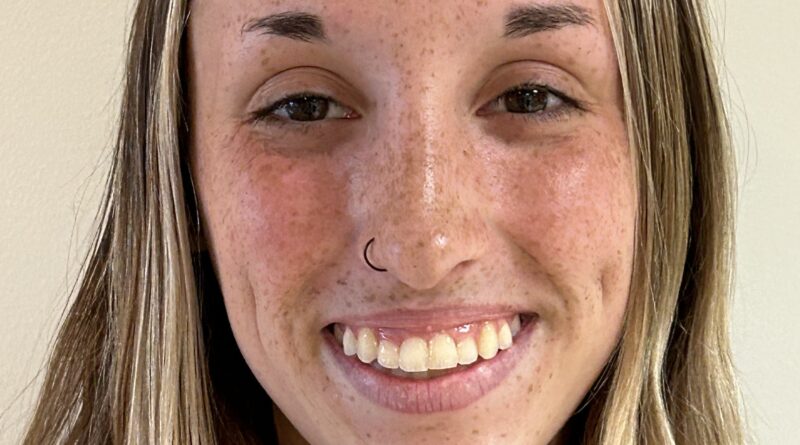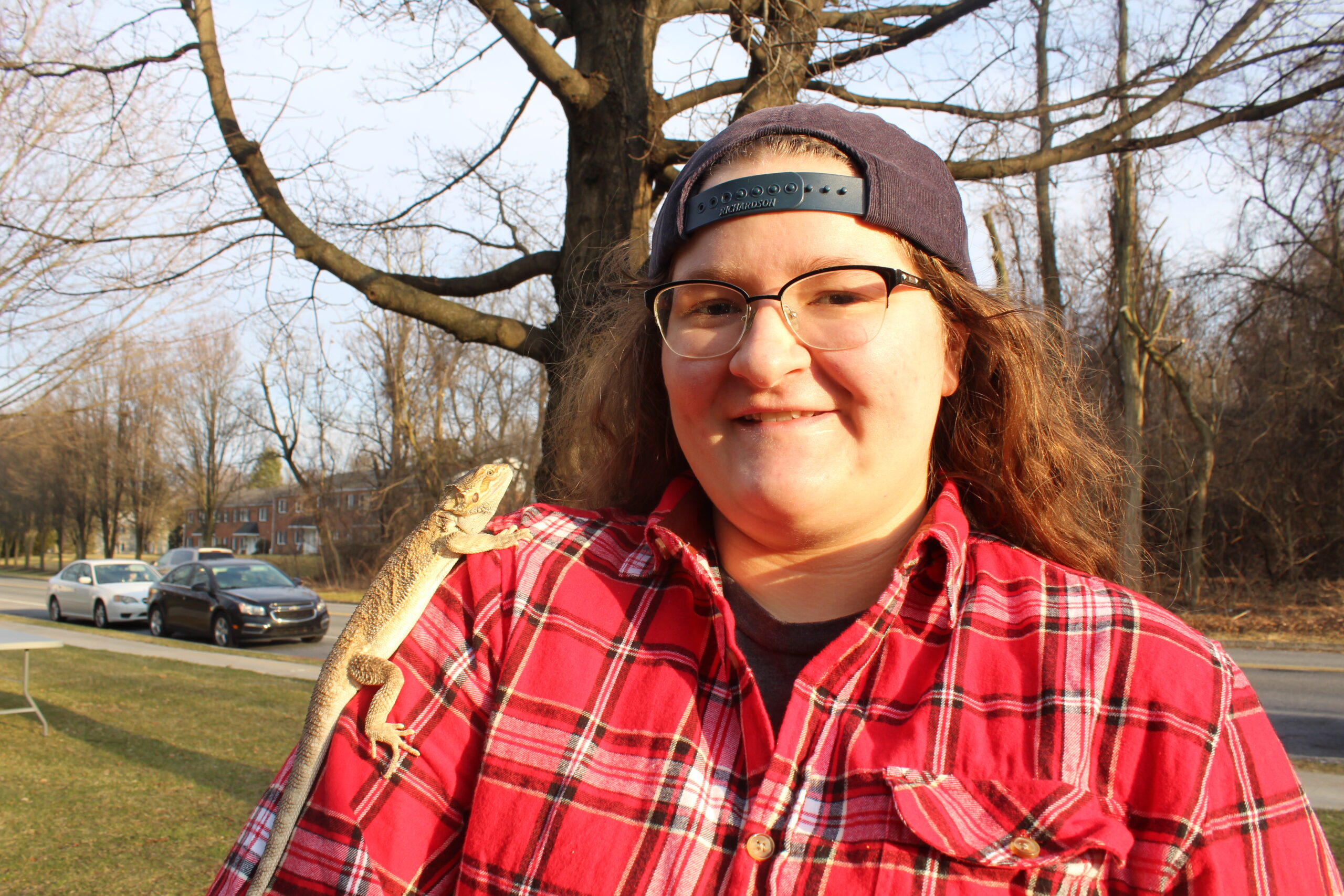When cancer strikes—out!
Central Penn student is empowered
saying ‘I beat cancer!’

By Hannah Pasquarella
Knightly News Reporter
When you are 21, your world tends to revolve around finishing assignments, planning internships and interviews, and finding out who you are meant to be. You expect late nights studying, laughter with friends and maybe the occasional moments of doubt about the future, but you never expect to hear the word “cancer” applied to you.
When that word entered my life, it didn’t come with a dramatic-movie moment or tears trickling down my face. It arrived quietly, through a phone call at work and a medical portal notification on my phone. It took away my routine, my sense of control and my understanding of what it means to be and feel healthy.
Now, as I near the end of my journey at Central Penn College, I have had time to reflect on how this experience reshaped everything—how I view life, resilience and even my identity. My story is not just about a diagnosis, but it is about learning how to carry on when life asks for more of you than you ever thought you could give.
The discovery
This story didn’t begin when I got the diagnosis.
Around December 2023, I started to not feel like myself and was experiencing unusual symptoms, including extreme hair and weight loss. A few abnormal tests later resulted in a referral to an endocrinologist. After more bloodwork and an ultrasound of my thyroid, I was diagnosed with hypothyroidism. My hypothyroidism was monitored through yearly bloodwork and ultrasounds of my thyroid, and for a good while, everything was stable again.
I didn’t think much of my hypothyroidism diagnosis except for the noticeable weight and hair loss that led me to get checked out, but over time, that got better. I wasn’t prepared for what was about to happen next.
On Feb. 19 this year, I received the call that changed everything. I was at my job, at Bath & Body Works, when I got the call from my doctor telling me that I had a nodule on my thyroid that needed to be biopsied to determine if the nodule was cancerous or not. I remember going through the rest of that shift as if nothing had happened, but driving home in complete silence with a mixture of numbness and disbelief.
Unfortunately, my family happened to be in Florida for a wedding during my biopsy, so I had my Grammy take me to the appointment. I am so grateful that I had someone who was there to distract me with questions. I remember feeling OK during the days leading up to the biopsy, but the moment that needle entered my throat, reality set in. That moment was brief but intense—and one I will never forget.
The diagnosis
A few quiet weeks passed with still no answers. Then, I got a call that gave me only more confusion and worry. The test result that I was hoping would provide me with some sort of relief was ruled inconclusive, which meant further testing and waiting. It was March 11, and I was getting ready for school when I saw a notification pop up on my phone from my health portal app. I never opened a notification so fast, and then, I never felt my heart beat as fast as it did when my eyes were figuring out that the results were telling me that the nodule was, in fact, cancerous.
I stood there frozen for a moment. I remember feeling my face get flushed so quickly and my hands shaking so much that I couldn’t concentrate on the words on the phone. I bolted down the stairs to tell my mom, and then quickly got interrupted by a call from my endocrinologist telling me what I had already found out and that I should come in to speak about options. The first people I told were my parents and my boyfriend, Damian. For weeks, they were the only ones who knew, but as things were figured out like a surgeon and a surgery date, more of my immediate family was informed.
Balancing life
Even though I was going through this, I continued my life and school like normal to give myself some sort of normalcy. I had only in-person classes twice a week, so I pushed through each day as if nothing had changed. I submitted my assignments, I showed up to class, and I participated, all while carrying a secret that felt heavier than anything.
I kept the truth hidden, except from the people closest to me. I didn’t want pity, and I didn’t want the constant looks or being asked if I was OK. I simply wanted to be treated like any other student, so I learned to wear a mask of composure. In reality, life was exhausting. Some days, I would sit in class barely hearing the lecture because my mind kept replaying all the unforgettable moments.
I was embarrassed by my diagnosis, and not because I was ashamed, but because I didn’t really know how to talk about it. I didn’t cry in public. I didn’t show fear. I put all my energy into making sure that others would see me as being okay. I was proud of how much I had managed to keep it together, but I also realized how much I was holding in. I explained the last three days leading up to my surgery as “rapid-fire 5 stages of grief,” and I say this because I went back and forth between denial, anger, bargaining, depression and acceptance.
Surgery and recovery
When surgery day arrived on May 23, I felt oddly calm—I liked to think that the chaos of the pre-op room helped with that. I simply just wanted the cancer out of my body; I felt gross.
When I woke up, I remember not being in much pain, just a tad uncomfortable and itching to get out of the hospital. I was told that the surgery itself wasn’t long, but waking up from anesthesia took longer than expected. However, I felt the biggest relief when I saw the picture the surgeon took of the removed cancer.
Recovery was not the worst thing I went through, but it certainly was not without frustration. Swallowing was a bit difficult at first; my neck was stiff and I wasn’t allowed to drive, so I felt “trapped” in a way.
On May 30, my surgeon called me to confirm what my family and I had hoped for all along: I was cancer-free. Hearing those words immediately lifted a weight off my shoulders, and I felt like I could smile without having to force it for the first time in a very long time. I shared the news with everyone almost immediately and decided to speak publicly about my experience for the first time.
Reflection and meaning
No one expects to face cancer, especially at the age of 21. It is frightening, isolating and deeply humbling. However, I will say that it helped me see a strength I didn’t know I had. Being able to say “I beat cancer” feels empowering, and not because I need validation, but because it reminds me of how far I have come.
Even though papillary thyroid cancer is one of the most treatable and common forms of cancer, it doesn’t make the experience any less significant. I still endured the fear, the uncertainty and the vulnerability that come with any diagnosis. I had difficult conversations with Damian about what the future could look like. My family and Damian were my anchors, even though they were struggling themselves.
This experience taught me not to take a single day or person for granted. It showed me who truly cared, and it reminded me that strength often looks quieter than we thought. If it weren’t for my hypothyroidism and the consistent monitoring that came with it, I might have never discovered that cancer at all.
Thyroid conditions are very common but are rarely talked about. I hope that by sharing my story, I can raise awareness about the importance of early detection and regular checkups.
Cancer will never define me. It is part of my story, but it is not the whole story. Each September, during Thyroid Cancer Awareness Month, I will continue to share my journey as someone who found strength and resilience in the face of uncertainty.
Pasquarella is vice president of The Knightly News.
Edited by media-club co-adviser and this blog’s editor, Professor Michael Lear-Olimpi.



